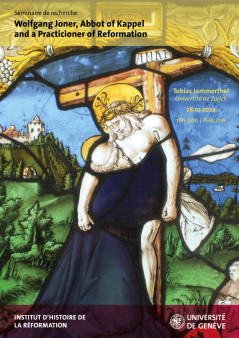The Reformation would have been inconceivable without shrewd theologians or powerful preachers such as Huldrych Zwingli – but it also could not have happened without prudent church practitioners. Wolfgang Rüpplin, mostly known as Wolfgang Joner, was such a practitioner. Elected abbot of the Cistercian house of Kappel am Albis in 1491, Joner soon perceived the signs of change, and gradually, but decidedly, signed himself and his convent up for serving the Reformation. Joner’s calling of young Heinrich Bullinger as the convent’s teacher in 1523 marked the development of Kappel’s convent school into a place of reformed learning and educating future clergy. In winter 1523/24, Abbot Wolfgang Joner took the results of the Zurich Disputations to the rural clergy in his area, and in 1525, he transformed his monastery’s minster into a proper reformed church building. As a practitioner of reform and, since 1527, first rural dean of the Zurich Säuliamt, Wolfgang Joner hold quite a stake in the implementation of Zwingli’s Reformation into church practice outside of Zurich’s city walls.
Intervention by Tobias Jammerthal (University of Zurich)
Veranstaltungsort
Kontakt
Zusätzliche Informationen
Kosten
